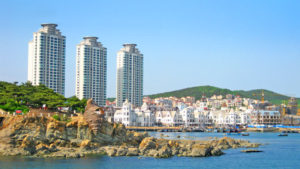[4-minute read]
Have you ever stumbled across a letter you wrote (or an essay, or a birthday card) that for some reason didn’t get where it was supposed to? I was looking through my ‘Drafts’ folder in Gmail for something that should’ve been there, and wasn’t. Then I wondered why I had so many drafts; mostly, I use that folder to keep copies of pieces as templates I might use again, such as letters accompanying a writing submission or the kind of email response I make repeatedly.

Dalian is a coastal city of over 6 million, nestled on and among hills. Like all Chinese cities, it is constantly changing. There is already much we wouldn’t recognize.
I don’t know what happened to the text below, or why it was still in Drafts. It looks like it might have been intended as a friends’n’family newsletter, and maybe it did form a part of something like that. Or maybe I plumb forgot to finish an email to whoever-it-was, but in any case, the piece moved me. It effortlessly flung me ten years backward. We were in China, my wife and 9-year-old son and me, approaching our first Christmas of what turned out to be five straight Decembers in the northeastern city of Dalian. We were adventuring, and escaping workplace frustrations, and trying to be of some use to the fledgling Baha’i community there, and learning our ever-loving heads off. Lately, as we approach the fifth anniversary of our permanent return to Canada, we have been reminiscing and brooding about the friends we left behind, many of whom we have little or no contact with anymore. I had left teaching high school (and an earlier stint writing in the Canadian government), while Diana was on sabbatical from environmental policy work. Our son Sam turns 19 soon, still speaks Mandarin well, and his coming of age and future vision push us all back to remembrance and wonder at that epic phase in our family life. What follows is how I looked at our first few months of life in Liaoning Province:
Though we are distressingly mortal, and have known the truth of the culture shock that often hits even the best-intentioned after the “honeymoon” period ends, we are well and prospering. China is an astonishing place. In practical terms, there are frustrations, but it is really not too difficult from the physical point of view. But it is a dazzlingly opaque culture to we foreigners, we moles, blind to even the most obvious of things. (To a friend, in front of our complex of apartment buildings: Kai, we need to find a photocopy place. Do you know where we could find one? Superb, resourceful, devoted Chinese friend: How about the one right there, across the street? Ah, yes. The big yellow sign with red characters. That one.)
Though my job is a job, it has the benefits that other teachers told me would be here: deeply serious and enthusiastic and appreciative students, and a general cultural framework in which education matters (sometimes even too much) and teachers are honoured (almost whether they deserve it or not). I am a week and a half from finishing my first semester as a teacher of conversational English and Western culture to Masters and Doctoral students, and I can say with certainty that I have learned more than the grand majority of my 408 (but who’s counting?) students…
Diana, though sometimes missing her professional and voluntary environmental work, has filled her days with the practicalities of making life work here, and with making friends and sundry human connections. She is so good at it. (For example, our good friend Anna visited again this week at our home, and her stories are greatly appreciated!) Diana is the centre of our shared life of service, and we have made many (most of them university students, as we live within walking distance of three universities) wonderful friends here, many of whom share our love of learning about matters of spirit and an ever-advancing civilization. When school resumes, she will be pioneering two courses in Environment and Business at one of the neighbouring schools (not mine) as well as teaching some conversational English to undergrads. And life will get a little busier, but our essential purpose will not change.
Sam, we sometimes think, has the hardest job of us all, as we have placed him in a local Chinese public school where he often has felt bored and alone. But he likes being in Dalian, in general, and has made fast and furious friends with an American boy (and his sisters). The first two months were very tough for him, but it gets better and better. Thankfully, he really enjoys the teaching and be-friending activities that so frequently bring new people into our orbit and into our apartment. He happily sings the prayer that begins “O God, guide me” in a Chinese that sounds pretty fluent to my ears, and with the help of “Alice”, another of our dear co-workers and friends, his Chinese speaking (and some writing) is progressing speedily.
Being here is a little like going on a spiritual fast, or some great quest: every day, whether we like it or not, we are vividly aware of our life’s purpose, and more in tune with the needs of the age, as well as we can understand them. And when the fruits arrive, often at the end of a sometimes frustrating or disorienting day, they taste wonderfully sweet and we think, This is the life…
And it was, you know, even if it was occasionally maddening.
Even if, now, I can’t quite remember who Anna was.
